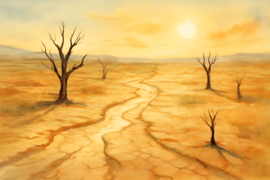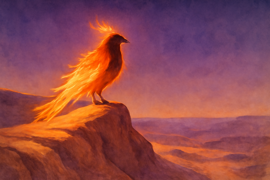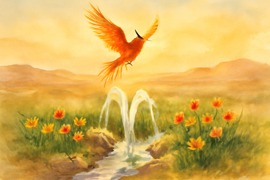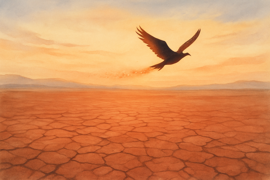Introduction
The Outback was a vast expanse of reddened earth that shimmered under the relentless sun, a place where life hung by a brittle thread. For years, the horizon had become nothing more than a wavering line of heat—no birdsong, no rustle of leaves in the spinifex, no laughter of children chasing clouds that never gathered. Cattle stations lay quiet as the stock dwindled, and families huddled around half-empty water tanks, sharing memories of seasons when rain fell freely. On the borders of the Tanami Desert, the ancient stories had grown faint, whispering of dreaming times and guardians of the land. It was said that beyond the scorched hills, in a narrow redstone gorge, an ember-winged bird of myth chose to sing when the world was at its most desperate. Its voice carried on thermal winds, promising renewal and sweep of life in its wake. Many dismissed it as mere legend, a comforting fable passed down by elders around a fire. But as the sixth year of drought pressed sunburned faces into anguish, even skeptics began to clamor for the impossible. Old Missima, a wiry elder with her hair like driftwood and eyes that held every dusk she’d witnessed, had never lost faith in the prophecy. She spoke of footprints etched in ochre stones and of feathers that glowed at dawn’s first light. Jack Harlan, a young station hand whose family had arrived on these grounds generations ago, decided to follow her lead. Together they packed the last liter of water, offered tobacco to the land, and slipped away before sunrise broke. They traveled by moonlight across skeletal plains, guided by ancient whispers that only the wind could carry. Their journey was one of tests: quicksilver storms of dust, ghostly stillness that clogged their throats, and the distant echoes of old spirits that beckoned them through the night. Yet beyond each grueling dune, the elders’ words endured. At dawn on the seventh day, they reached the gorge walls themselves as the sky blushed with early light, and for a moment, the world held its breath.
The Drought That Silenced the Land
The drought began innocently enough, as a season that lingered longer than expected. First the rains delayed by weeks, then by months, until the skies remained a blank sheet of unbroken blue. In the early days, families uprooted vegetable patches, carried buckets to distant wells and shared supplies with neighbors. The last swamp yabbies dried up in their muddy beds. Wallabies followed watering holes deeper into the scrub, and flights of galahs circled overhead, their pink wings faded under the unrelenting harvest sun. The earth groaned, the crevices in stone grew wider, and acrid dust coated everything—skin, clothes, the tongues of children who still dared to speak. Cattle became thin and black gums at campsites wept sap, unable to sustain their own growth. By the third year, the Outback was a muted world. Colors bled from sunsets, birdsong became a memory sung only by elders at evening fires. Winds carried sand like whispers of ghosts, and nomadic lizards slipped beneath sun-warped rocks, hiding from the blistering ground. Every creek bed was a dried scar on the landscape’s skin, every shadow precious. Yet among this harsh silence, the Dreaming held a promise: the Firebird would appear when the parched land and hearts both longed for a spark.

{IMAGE}
As the seasons stretched on, small communities began to fracture. Families sold off stock, moved inland to towns with working boreholes, and the few who stayed behind marked the names of their loved ones in the dusty ledger of the local station. Schools closed, leaving empty desks where once laughter and chalk dust had flown. Supper around shared tables dwindled to black tea and damp bread. But deep in the red earth, ancient rivers slept under layers of stone and time-conscious sands. They waited, as all things do in country where seasons circle back. Even the great ghost gum trees clung to life, their twisted limbs raising in silent prayers. In stories around dwindling campfires, whispers shifted from sorrow to hope. They spoke of feathers like living ember, of a song that carried the warmth of dawn itself, waking hidden springs and persuading the wind to gather rain. That new belief threaded through hearts like a slow fanning flame, igniting voices ready to call out across the dunes.
The Emergence of the Firebird
On the dawn of the seventh morning, when the sky was pale and the horizon barely a suggestion of glow, Jack and Elder Missima reached the mouth of the hidden gorge. The walls of red rock soared overhead, layered like the pages of some ancient scripture. Beside a narrow creekbed, they traced footprints in ochre dust so fresh that the edges still glowed with a faint warmth. Missima’s voice was soft as a whispering wind: “She’s close, boy.” They pressed deeper into the chasm, feeling embers in the air. The wind, though still and humid, carried the faint scent of smoke and rain yet to fall. And then—through a gap in the boulders—they saw her. A bird-sized greater than an eagle, perched on a jutting ledge, its feathers aflame with living fire. Each plume burned golden at the base, churned to molten orange at the tips, and left a drifting trail of sparks that floated downward like glowing ash. Its eyes were a calm ember, ancient and knowing, and its beak curved like a streak of light.

The Firebird remained utterly still, as if listening for a summons only it understood. Below, the water in the dried creekbed trembled, forming curving patterns in the dust. Jack swallowed, feeling his heart pound like a drum gone mad. Missima knelt, gathering a handful of dust and whispering words that sifted through time. Jack followed her lead, letting the fine powder run through his fingers, offering it silently. The Firebird tilted its head, the glow of its plumage pulsing in rhythms that matched the heartbeat of the gorge. A hush enveloped them—no creaking branch, no rustle of wings, not even the flutter of a cicada’s wing. Then, in a single fluid movement, the Firebird rose into the pale dawn sky, its wings unfurling like sheets of living flame. It circled twice, each loop trailing embers that danced on the light breeze.
As it soared, Jack felt a shiver of anticipation ripple through the chasm. The air itself seemed to shift—the heat growing gentle, the emptiness of dust air filling with a promise of moisture. The Firebird’s wings beat once, twice, and on the third uplift, it opened its beak. No bird’s song ever carried such resonance. It was a sound that rose like liquid fire, a melody that wound around the canyon walls, drawing out hidden echoes. The song was both lament and rejoicing, a voice older than the red earth, older than the Dreamtime itself. It vibrated through Jack’s bones, calling to every parched root and thirsty vein in the land. Overhead, the sparks wove into the dim dawn, clustering into wisps of heavy mist that drifted down toward the cracked earth.
The Fiery Song and the Revival
From the moment the Firebird’s song split the morning air, the gorge transformed. Where stones had been dry and dusty, thin rivulets of water bubbled from hidden fissures in the rock. Each note of its melody coaxed new springs to life, the water spilling into the creekbed in silver threads that wove together into a rushing stream. Dust turned to mud, mud to pools, and within hours, the sound of running water echoed like a chorus. Jack and Missima watched in wonder as slender reeds sprouted along the banks, their green shoots trembling in the gentle current. Higher above, rock-hollow wombats blinked from their dens, kangaroo rats hopped toward the fresh water, and galahs dipped their heads to drink at the widening creek. The air filled with the scent of damp earth and fresh blossoms—the first flowers in years bursting open like fireworks across the gorge walls.

Villagers who had gathered at the rim saw the spray of morning light above the gorge and heard the distant echo of a song. They spilled down narrow tracks, children on their parents' shoulders, elders leaning on long staves. When they reached the stream’s edge, they found Jack and Missima with faces streaked in red dust and tears of astonishment. The Firebird hovered above, its body radiating warmth that felt more like gentleness than flame. Its eyes met theirs, and that same song washed over them again—a promise and an embrace. The villagers lapped water from cupped hands, letting it slip back into the stream in reverent circles. Some pressed palms against flowering rocks as if greeting old friends, while mothers lifted infants to see the living ember-bird that legends had only hinted at.
Under the Firebird’s watch, the land extended its hand in gratitude. Spinifex hummed with green shoots, ghost gums swelled with sap, and tiny water beetles danced on the surface of lily-strewn pools. A steady drizzle began to fall, soft and sure, gathering into a steady rain that washed the red dust from the rocks and filled shrunken waterholes across the plateau. In the village below, drums began to beat, voices sang ancestral chants, and the community celebrated the return of hope. The Firebird circled once more in a spiral of flame, then, with a final brilliant cry, it lifted beyond the gorge entrance and vanished into the sunrise. Its trail of embers drifted upward, dissolving into the morning sky like tears of light.
Even after it disappeared, the land did not grow silent again. The creek’s voice became a constant hum, the birds returned in flocks, and across miles of Outback, every parched soil turned lush green. Families rebuilt fences, stock roamed on fresh grass, and children danced in puddles that mirrored the blue sky. And though no one saw the Firebird again, its fiery song continued in every drop of water, every flower bloom, and every whispered prayer that carried on the wind of a land awakened.
Conclusion
In the waning light of that miraculous day, the villagers gathered by the newly formed creek and shared stories of the Firebird’s arrival. They carved tokens of ember-feathers into wooden totems, which now stand at the entrances to homesteads and watering holes across the Outback—a reminder that hope can kindle even in the driest of seasons. Parents recount the tale to children at bedtime, weaving lessons of respect for the land, the power of community, and the timeless promise that nature holds hidden wonders when belief endures. Scholars from distant cities travel dusty roads to study the resurgence of the gorge, yet none can fully explain how a single song awakened aquifers thought to have vanished. In every beam of dawn and every gentle rainfall that follows, one hears the echo of the Firebird’s melody—a sound beyond words that nevertheless teaches us to listen, to trust, and to honor the sacred ties between land and spirit. And so the legend of the Firebird of the Outback endures, casting a warm glow across generations and proving that in the heart of the harshest wilderness, life always finds a way to rise anew, carried on wings of flame and song that never truly fade away.

















